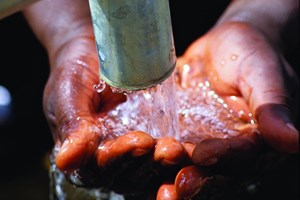Wisconsin governor greenlights funds for PFAS eradication in stormwater, sewer systems
(UI) — Gov. Tony Evers and the Wisconsin Department of Natural Resources (DNR) has announced new funding available to help communities address per- and poly-fluoroalkyl substances (PFAS) contamination in wastewater.
The available funds will support various projects, including constructing buildings for sanitary sewer, storm sewer, or wastewater treatment plants that require groundwater dewatering in PFAS-contaminated areas. Additionally, expenses related to biosolids sampling, storage, processing, and disposal for facilities investigating or dealing with PFAS in biosolids are covered. Other eligible projects include reconstruction or lining of public sanitary or storm sewers to reduce inflow and infiltration of PFAS-contaminated groundwater or stormwater.
“This new funding is a continuation of our efforts since 2019 to help make sure all Wisconsinites can trust that the water coming from their tap is safe and free from harmful contaminants like PFAS,” said Gov. Evers. “I encourage all eligible municipalities to apply for these funds so that we can get our state another step closer to eliminating PFAS contamination in our water systems once and for all.”
The state’s Clean Water Fund Program (CWFP) is a state revolving loan fund that provides financial assistance to municipalities for wastewater and storm water infrastructure projects by providing reduced-interest rate loans, and in some cases, additional subsidy in the form of principal forgiveness to reduce the size of a loan. The CWFP now includes funding dedicated to projects that address emerging contaminants, such as PFAS.
The Clean Water Fund Program Intended Use Plan (IUP) for State Fiscal Year (SFY) 2024 provides in-depth information about available funding, including sources and uses of funds, project types, eligibility, loan terms, and federal requirements. The IUP identifies at least $2.5 million in available funding for municipalities to complete wastewater or sewer system projects that reduce or eliminate PFAS contamination.
The funding also supports landfill leachate treatment to remove PFAS before discharge, implementing best management practices to decrease PFAS concentrations in stormwater at contaminated sites, and carrying out PFAS removal at treatment works.
Furthermore, the funds will be used for groundwater remediation projects on publicly owned sites where there is no responsible private party identified. These initiatives aim to combat PFAS contamination and ensure the protection of Wisconsin's water resources.
Project eligibility, scoring, and funding considerations are listed in detail in the IUP. To be eligible to apply for funding in SFY 2024, applicants must first submit a variance request by Aug. 15, 2023, as the Intent to Apply (ITA) deadline for this fiscal year has already passed.
Applicants seeking funding available in SFY 2025 do not need to submit a variance request but should submit an ITA by Oct. 31, 2023, with a full application, including an approved facility plan and final plans and specifications, due Sept. 30, 2024.
Related News
From Archive

- Glenfarne Alaska LNG targets late-2026 construction start for 807-mile pipeline project
- U.S. water reuse boom to fuel $47 billion in infrastructure spending through 2035
- $2.3 billion approved to construct 236-mile Texas-to-Gulf gas pipeline
- Major water pipe break in Puerto Rico hits over 165,000 customers
- Potomac River Tunnel project enters construction phase beneath Washington, D.C.
- Pennsylvania American Water launches interactive map to identify, replace lead water service lines
- Trump's tariffs drive $33 million cost increase for Cincinnati sewer project
- Utah city launches historic $70 million tunnel project using box jacking under active rail line
- Tulsa residents warned after sewer lines damaged by boring work
- Fatal trench collapse halts sewer construction in Massachusetts; two workers hospitalized




Comments